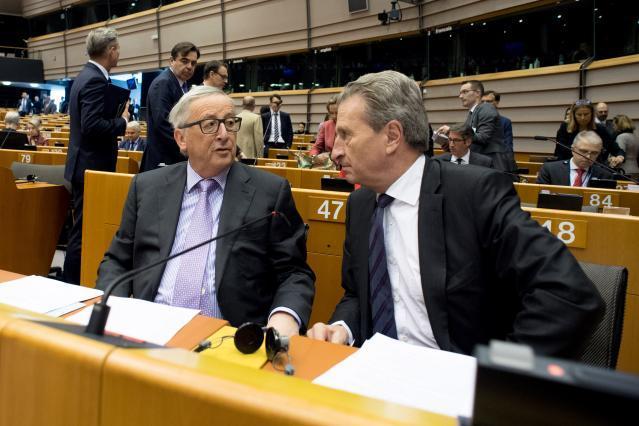Happy E-day to all!
Linking the rule of law to cohesion funds puts unity in question again

Source of the photo: European Commission
„Alle Menschen werden Brüder, jeder nimmt die Schuld auf sich. Öffnen ihre Herzen wieder, voll Vertrau’n und Zuversicht.” In 2003, my hometown organized huge celebrations on Europe Day. It was the biggest thing to cherish since the fall of the iron curtain: the leaders of post-communist countries had finally signed the EU accession treaty in Athens a couple of weeks before that 9th May. We, narrow-minded teenagers could barely understand how important that day was for our history and were just laughing at the lame lyrics of the Ode to Joy that we had to sing in languages we hadn’t mastered yet.
In the last fifteen years, Eastern Europeans have learnt many languages, including the EU jargon. This is why everyone understands the message that the European Commission’s recent proposal for the 2021-2027 EU budget reveals. The era of taking advantages of richer brothers and sisters is over unless we respect the commonly accepted rules of the family.
Several political scientist have kicked-off their career by exploring the links between the Eastern enlargement and a sort of rhetorical trap in which Western member states got stuck after their careless promises made during the 1990s. Drowning in the euphoria of the change of regime and a bit of remorse for letting down their sisters and brother for decades, Western politicians promised EU membership to their ex-communist counterparts, if they succeed to introduce the foundations of liberal democracy and market economy in their countries. Once the Copenhagen criteria were more or less fulfilled, Western Europe would have lost its face if they didn’t keep their word, even if they weren’t hundred percent sure they truly wanted this.
In an ironic way, Westerners could never imagined that the other part won’t keep their promise once they had made a gesture towards them. Backsliding in democracy and rule of law was something unbelievable, especially from the part of the two best students of democratization, Poland and Hungary. It took several years for EU leaders to find a way to react. But we finally got there.
The Commission proposed “to equip the Union to protect its budget when weaknesses in the rule of law impair – or threaten to impair – sound financial management or the financial interests of the Union” if the following criteria are not fulfilled:
- The proper functioning of the authorities implementing the Union budget
- The proper functioning of investigation and public prosecution of fraud or corruption relating to the budget
- The effective judicial review by independent courts
- The prevention and sanctioning of fraud, corruption or other breaches of EU law relating to the budget
- The effective and timely cooperation with the European Anti-Fraud Office and with the European Public Prosecutor’s Office.
Bulgaria, Romania, Hungary and Poland have already expressed their disapproval for the Commission’s plan, calling against “black-mailing” and “double standards”. Their arguments are partially true because corruption, judicial independence or proper functioning of authorities are way harder notions to measure objectively than economic indicators. But it is also completely understandable that net payers are reluctant to allocate cohesion funds to countries where something goes in profoundly different than expected. Especially since they never really wanted to do so and just felt to be in a rhetorical trap. But this recent attempt to correct the errors of the past seems to go in vain as well. As Prime Minister Viktor Orbán has pointed out on Friday: keep calm, there is no EU budget without Hungary’s consent.
Well, sisters and brothers united in the European spirit, keep calm, celebrate the E-day and brace yourselves for several years of budgetary fights!
